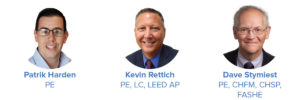SSR Celebrates Professional Engineers Day
Today (August 4th) is Professional Engineers Day. The purpose of the day is to celebrate licensed professional engineers by raising awareness about what it means to be a PE, recognizing licensed PEs, and showing appreciation for the work they do every day. At SSR, we’d be nowhere without our engineers. To recognize the day, we asked some of our superlatives about their experiences as engineers.

Patrik Harden, PE (Electrical Engineer, Houston) – One of SSR’s newest PEs
Kevin Rettich, PE, LC, LEED AP (Principal, Sarasota) – PE with the most state registrations (40!)
Dave Stymiest, PE, CHFM, CHSP, FASHE (Senior Consultant, Louisiana) – SSR’s longest licensed engineer (43 years!)
What made you pursue a career in engineering?
PH: Before I started college, I would take things apart just to see how it works. Occasionally, I would be able to get it back together in working order. There is a saying for engineering mentality… “If it isn’t broke, let’s take it apart and find out why.” That is me.
KR: Since I was a child, I wanted to know how things worked. I would take apart things and put them back together. My mom wasn’t always happy with me doing this. As I continued through school, I found I was good at and enjoyed math and science. Engineering seemed like a logical choice. So, it came down to which particular type of engineering I wanted to do. I started working for an electrical contractor while I was in school and this sparked my interest in becoming an electrical engineer in the power side of the business.
DS: My high school guidance counselor recommended that (based on my aptitudes in math, science, and English) I consider applying to Rensselaer Polytechnic Institute (RPI), a nearby well-known engineering college in upstate New York State. After considering RPI along with some other colleges and universities, I decided to apply to RPI early admission — and was accepted. After the first two years I decided to major in their Electric Power Engineering (EPE) curriculum to get both my BS-EPE and my Master of Engineering-EPE. After all these years, I still thank that guidance counselor for guiding me to consider a career path that interests me even today.
What have you found fulfilling about your career?
PH: I like working in a place with a lot of intelligent respectful people. Further, the work is always changing which keeps things interesting.
KR: What I find most fulfilling is watching a project go from a concept to the moment I’m standing in the building, knowing I had a part in engineering it. It is such a thrill to see the completed project, knowing you took an idea and helped create this living breathing building.
DS: I have been able to use my education and professional interests in many different industries — starting as a consulting EE for nuclear power, fossil fuel power, solar power, commercial, and industrial clients, a major university as both the owner and the consultant, a major health care system as an owner, and then for the past 20 years as an SSR consulting engineer and most recently as a facility engineering and facility management consultant to owners and facility directors in a wide spectrum of entities. I have been particularly lucky to be able to spend time teaching and writing as well.
How do you use your engineering background outside of the office?
PH: I recently added a whole house surge protection, generator breaker, circuit, 50Amp plug to back up my house in the event of outage.
KR: I use my engineering background of not only electrical items but also mechanical, plumbing, and structural to help me be the on-site “engineer” for my condo complex. I am the on our association board and am always looked upon to solve most of the issues that come up with maintaining the building and our pier. It has ranged from our on-site generator, HVAC issues, and structural reinforcing of our pier. My engineering background has helped me solve complex issues by knowing where and how to get answers. If something is new to me, I have the tools to find out the correct solution.
DS: I always wanted to know how things work, even since junior high school. I still try to figure out how things work, both physical entities and human processes. Today’s world provides a broad spectrum of questions to think about.
Any advice you’d give to a high school student interested in engineering?
PH: Don’t try to understand the question only but understand why it is being asked. Always try to see beyond the obvious.
KR: If I had to go back and give myself advice for high school and college, it would have been to take more psychology and sociology classes. Engineering is more than math and science. It all about dealing with people — clients, colleagues, and others. You must be able to understand what people are telling you and how to react to those items. One of my strengths that I continue to work on is understanding “my audience.” I need to be able to take engineering concepts and communicate those to others who are not engineers. Some items may be highly technical, so you need to put in a language that your audience can understand. You need to watch for visual cues and adjust your presentation.
DS: Go after what really interests you. Do your best, and question everything. Never stop learning.







